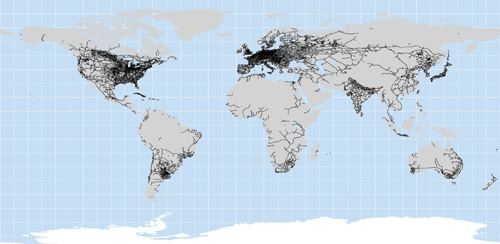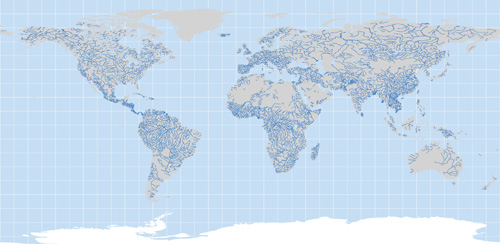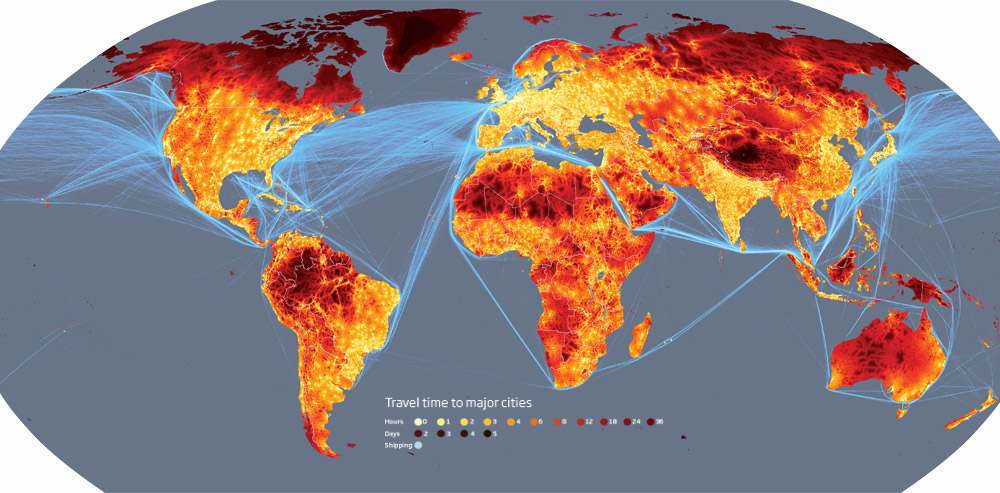How much of the earth can humans now access? Some images developed by the New Scientist (via ChartPorn) give us some great visuals showing just how thoroughly we’ve colonized the (non-ocean) planet.
A map of all roads:

A map of all railroads:

A map of all navigable rivers:

Considering all of these modes of transportation and the type of terrain, the New Scientist calculated how long it would take, from everywhere on the planet, to get to a city of 50,000 people or more:

They estimate that less than 10% of the world is more than two days from the nearest city. The most remote place, they calculate, is the Tibetan plateau.
—————————
Lisa Wade is a professor of sociology at Occidental College. You can follow her on Twitter and Facebook.

Comments 23
Deaf Indian Muslim Anarchist — November 6, 2009
This is really fascinating. I'm curious why the Midwest in United States doesn't have much railroad access as the East coast does.
R — November 6, 2009
Also, DIMA, just fyi what most Americans call the "Midwest" refers to the area between the Appalachian mountains and the Mississippi river. On the above map, the "Midwest" does have decent railroad coverage (almost entirely freight, not passenger); that dark black area at the southern part of the Great Lakes is Chicago, for reference. The area to the west of that where railroad coverage dwindles is called simply the West. And yes, enormous mountains + low density is the reason for less coverage. The edge of the West Coast gets back into darker coverage areas where the mountains drop off and density increases substantially.
mordicai — November 6, 2009
Hey, good job, humans!
Elena — November 6, 2009
What do they consider a navigable river? I can only speak for the few pixels that comprise Spain, but you usually can't sail anything bigger than a zodiac boat when you go a few hundreds of kilometers inland. And besides, the rivers tend to dry out in summer...
On the other hand, canal networks built for transporting goods (such as the ones in the UK or the south of France) aren't usually considered rivers.
As for railroads, you have to love Die Bahn. Best trains in the world <3
It would be interesting to see a map of high-speed railroads (like the shinkansen in Japan or the TGV in France), too.
The Amazing Kim — November 6, 2009
I'm honestly surprised that Greenland has no roads. Or trainlines. Or rivers. Or, people.
Samuel John Klein — November 6, 2009
Yet, somehow, whenever your car gives it up. You're always about a googol's worth of miles away from the nearest service or rescue, no matter what road you're on or how close to any actual town.
Reality is a strange place.
@Elena: the navigability of a river seems just as frequently to be determined by local statute as it is by whether or not you can actually get a boat up it enough to support any sort of river traffic. At least that's the way it is here in Oregon, where property values and local governmental control (and attendant environmental enforcement laws) tend to obtain differently depending on whether or not that stream abutting your property is defined as "navigable".
“A road to somewhere” « The Tiny Ouroboros — November 8, 2009
[...] “A road to somewhere” From New Scientist by way of Sociological Images: [...]
Fizzleblizzle — November 9, 2009
That is quite shocking. If less than 10% of the world is 2 days away from the nearest city imagine what that number will be in 2025. Of course, seeing as the world doesn't end in 2012 ;)
But really, technology is only going to advance and travel is going to become a lot easier. I like it though. Horray for the world.
Mary McGuire — November 14, 2009
We are genetically programmed to fear change and the unknown.Lighten up people, what a wonderful planet we inhabit. We will not destroy the world although we may destroy ourselves. We live in the best era that any human has ever lived and yet we focus on the negative. There are fewer wars, fewer people dying from disease, we live longer, have easier lives and pass more on to our children. We are no longer under the threat of nuclear war nor are the Nazi's in control of the world. Happy days; live love respect and be happy!
Sdbaral — July 6, 2012
what does this colonization reflect? It is the human aggression and an intelligence of confrontation which we have harvested so far. let us arouse in us some love for all beings human and nonhuman, and shun our petty cultural and religious dogmas.
SDBaral
Timothy W. Cooper — August 5, 2018
With regard to our colonization of earth, I recommend J. Rifkin with T. Howard Entropy A New World View 1980. " Throughout history, there have been exceptional cultures which have been able to survive for long periods of time within the same energy environment. They were able to make the transition from a colonizing to a climactic stage... adapting to the existing environment meant SLOWING DOWN THE FLOW_THROUGH OF ENERGY and thus slowing down the entropy increase in the overall environment.." Mars which some are excited about may be much closer to heat death than earth. There may not be much there to access energy even compared to the current state of the earth.